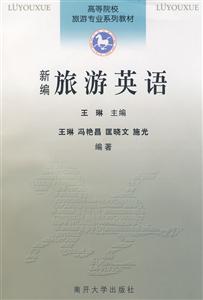-
>
考研英語背單詞20個詞根詞綴
-
>
西班牙語詞根寶典
-
>
美國K-12原版語文課本--初中·下(全12冊)
-
>
流浪地球劉慈欣
-
>
西南聯大英文課 輕讀禮盒版
-
>
英語大書蟲世界經典名譯典藏書系:中國人的精神 (英漢對照)(精選權威版本)
-
>
許淵沖譯唐詩三百首:漢文·英語
新編旅游英語-(含光盤兩張) 版權信息
- ISBN:9787310029532
- 條形碼:9787310029532 ; 978-7-310-02953-2
- 裝幀:暫無
- 冊數:暫無
- 重量:暫無
- 所屬分類:>>
新編旅游英語-(含光盤兩張) 內容簡介
本書參考《大學英語教學大綱》對專業英語教授學時和閱讀總量的要求,以語言教學中的功能意念教學法為指導思想,結合旅游六大要素“吃、住、行、游、購、娛”,將內容分為相應的六個模塊。整篇內容以模塊為綱,以旅游活動為線,創設情景對話,精選相關文章。對話強調功能性、真實性和實用性,文章則突出知識性、趣味性和可讀性。書末還根據行業從業人員的實際需求,以附錄的形式介紹了“導游過程中的突發事件及其應急方法”,力求向學生提供其未來工作崗位所需要的專業英語知識和技能,培養專業英語交際能力,體現出專業英語學習和教學特征。
本書由六大模塊、二十個單元組成,每單元包括“聽與說”,“閱讀與翻譯”和“模擬寫作”三部分。**部分為“聽與說”,其目的是培養學生以英語進行專業內容口語交際以及跨文化交際的能力;第二部分為“閱讀與翻譯”,其目的是培養學生閱讀和專業英語翻譯的能力;第三部分為“模擬寫作”,其目的是培養學生參照范例用英語擬寫和翻譯商業信函、摘要、廣告或圖表說明等應用文的能力。
新編旅游英語-(含光盤兩張) 目錄
unit 1
part ⅰ listening and speaking
part ⅱ basic reading: marco polo and his travels
part ⅲ simulated writing: speech of welcome
unit 2
part ⅰ listening and speaking
part ⅱ basic reading: guiding principles of intercultural communication
part ⅲ simulated writing: letter of inquiry
unit 3
part ⅰ listening and speaking
part ⅱ basic reading: transportation in china
part ⅲ simulated writing: advertisement
unit 4
part ⅰ listening and speaking
part ⅱ basic reading: magnificent china tour
part ⅲ simulated writing: a letter of thanks
module 2 accomondation
unit 5
part ⅰ listening and speaking
part ⅱ basic reading: the hotel of future
part ⅲ simulated writing: registration forms
unit 6
part ⅰ listening and speaking
part ⅱ basic reading: caneer paths and opportunities in the hotel or lodging business/49
part ⅲ simulated writing: agenda of meeting
module 3 catering
unit 7
part ⅰ listening and speaking
part ⅱ basic reading: eight cuisines in china
part ⅲ simulated writing: menu
unit 8
part ⅰ listening and speaking
part ⅱ basic reading: food tourism is on the boll
part ⅲ simulated writing: reply to letter of complaint
unit 9
part ⅰ listening and speaking
part ⅱ basic reading: about tea
part ⅲ simulated writing: letter of invitation
module 4 sightseeing
unit 10
part ⅰ listening and speaking
part ⅱ basic reading: travel agency
part ⅲ simulated writing: scheduled itinerary
unit 11
part ⅰ listening and speaking
part ⅱ basic reading: world heritage site
part ⅲ simulated writing: notice
unit 12
part ⅰ listening and speaking
part ⅱ basic reading: heritage gardens in suzhou
part ⅲ simulated writing: letter of job application
unit 13
part ⅰ listening and speaking
part ⅱ basic reading: the great wall revisited
part ⅲ simulated writing: e-mail
unit 14
part ⅰ listening and speaking
part ⅱ basic reading: travel agency management/128
part ⅲ simulated writing: letter of recommendation /135
module shopping
unit 15
part ⅰ listening and speaking
part ⅱ basic reading: shopping malls
part ⅲ simulated writing: order form
unit 16
part ⅰ listening and speaking
part ⅱ basic reading: chinese embroidery/148
part ⅲ simulated writing: claim letter
module 6 entertainment
unit 17
part ⅰ listening and speaking
part ⅱ basic reading: walt disney world resort
part ⅲ simulated writing: memorandum
unit 18
part ⅰ listening and speaking
part ⅱ basic reading: beijing opera
part ⅲ simulated writing: writings based on tables and graphs
unit 19
part ⅰ listening and speaking
part ⅱ basic reading: the development and features of chinese philosophy
part ⅲ simulated writing: a message or note/183
unit 20
part ⅰ listening and speaking
part ⅱ basic reading: sustainable tourism
part ⅲ simulated writing: resume
appendix
frequently asked questions on emergencies & their contingency measures
key to the exercises
references
新編旅游英語-(含光盤兩張) 節選
《新編旅游英語》參考《大學英語教學大綱》對專業英語教授學時和閱讀總量的要求,以語言教學中的功能意念教學法為指導思想,結合旅游六大要素“吃、住、行、游、購、娛”,將內容分為相應的六個模塊。整篇內容以模塊為綱,以旅游活動為線,創設情景對話,精選相關文章。對話強調功能性、真實性和實用性,文章則突出知識性、趣味性和可讀性。書末還根據行業從業人員的實際需求,以附錄的形式介紹了“導游過程中的突發事件及其應急方法”,力求向學生提供其未來工作崗位所需要的專業英語知識和技能,培養專業英語交際能力,體現出專業英語學習和教學特征。
《新編旅游英語》由六大模塊、二十個單元組成,每單元包括“聽與說”,“閱讀與翻譯”和“模擬寫作”三部分。**部分為“聽與說”,其目的是培養學生以英語進行專業內容口語交際以及跨文化交際的能力;第二部分為“閱讀與翻譯”,其目的是培養學生閱讀和專業英語翻譯的能力;第三部分為“模擬寫作”,其目的是培養學生參照范例用英語擬寫和翻譯商業信函、摘要、廣告或圖表說明等應用文的能力。
新編旅游英語-(含光盤兩張) 相關資料
Such assumptions stem from potentially devastating ignorance and can lead to much frustration for members of both cultures Entering a culture with this type of ethnocentrism, the assumption your own culture is correct, is another byproduct of ignorance and cultural misunderstanding. Main types of misunderstanding are Language
Even when two people think they can speak each other's language, the chance of error is high Usages and contextual inferences may be completely different between cultures. So even though one speaker may have learned the vocabulary of the other's language, selecting the most appropriate words, with the correct intonation, spoken with appropriate eye contact while standing a proper distance from the other are all critical even before one considers the propriety of the topic to be discussed. Rights, values, and needs
Some cultural characteristics will be easy to identify, e.g. whether people are conscious of status or make displays of material wealth. But many rights are assumed, values are implied, an d needs are unspoken, (e.g. for safety, security, love, a sense of belonging to a group, self-esteem, and the ability to attain one's goals).
For example, issues of personal security, dignity, and control will be very different as between an a bled and a disabled person. Similarly, there may be problems of respect when a person from a rigidly class-based culture meets a meritocrat2, or where there is racism, sexism or religious intolerance in play. In such situations, identity is fundamental when disputing the proper role or "place" of the other, about who is in control of their lives, and how they present themselves to the outside world. But the reality is more deeply rooted in power relationships: about who is on top of the social, economic, and/or political hierarchy. Family members or long term rivals may be obsessed with their mutual competition. The relationships between racial or ethnic groups may be affected by economi
- >
姑媽的寶刀
- >
苦雨齋序跋文-周作人自編集
- >
中國歷史的瞬間
- >
名家帶你讀魯迅:朝花夕拾
- >
羅庸西南聯大授課錄
- >
新文學天穹兩巨星--魯迅與胡適/紅燭學術叢書(紅燭學術叢書)
- >
煙與鏡
- >
自卑與超越

















